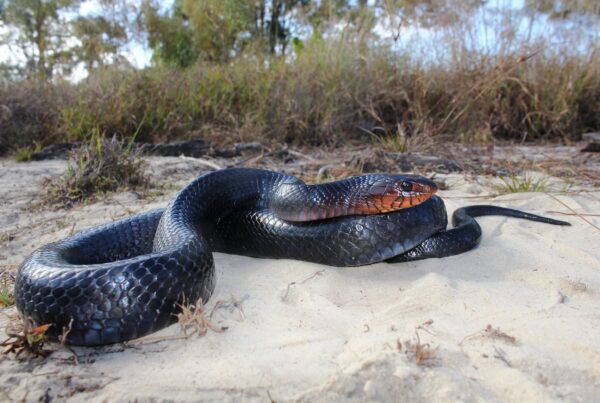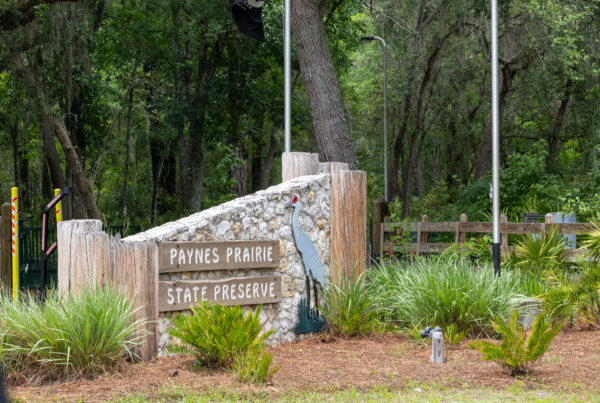
Florida, known for its diverse ecosystems and abundant wildlife, is facing a critical legislative challenge with the “Taking of Bears” legislation (HB 87). This bill will allow lethal means to defend oneself and personal property when threatened by a Florida black bear. The Florida Wildlife Federation (Federation) is opposed to this legislation because it preempts the Florida Fish and Wildlife Conservation Commission’s (FWC) constitutional authority to manage Florida’s wildlife, with the iconic Florida black bear setting a harmful precedent.
The FWC is our state’s agency responsible for managing and regulating the conservation, protection, and sustainable use of Florida’s fish and wildlife resources. The Federation has played a significant role in advocating for the ability of FWC to serve in this role. The FWC was first established in 1943 as Florida Game and Freshwater Fish Commission. In 1998, a constitutional ballot amendment passed establishing the FWC as a constitutional authority due largely to the Federation. The Federation, along with other conservation organizations, worked to raise awareness about the importance of consolidating and strengthening wildlife management efforts in the state. Through our collective public outreach, education, and advocacy efforts, Amendment 5 passed, which enshrined the FWC’s role in the Florida Constitution.

Regarding the Florida black bear, through its constitutional authority to regulate wildlife, the FWC adopted rule 68A-4.009 Florida Black Bear Conservation Florida Administrative Code. Under the FWC rule:
(1) No person shall take, possess, injure, shoot, collect, or sell black bears or their parts or to attempt to engage in such conduct except as authorized by Commission rule or by permit from the Commission.
(2) The Commission will issue permits authorizing intentional take of bears when it determines such authorization furthers scientific or conservation purposes which will benefit the survival potential of the species or to reduce property damage caused by bears. For purposes of this rule, activities that are eligible for a permit include:
(a) Collection of scientific data needed for conservation or management of the species;
(b) Taking bears that are causing property damage when no non-lethal options can provide practical resolution to the damage, and the Commission is unable to capture the bear.
(3) The Commission authorizes members of the public to take a bear in an attempt to scare a bear away from people using methods considered non-lethal. Staff shall authorize specific methods and situations that qualify for this authorization at http://MyFWC.com/bear/.
(4) The Commission will provide technical assistance to land owners and comments to permitting agencies in order to minimize and avoid potential negative human-bear interactions or impacts of land modifications on the conservation and management of black bears. The Commission will base its comments and recommendations on the goals and objectives of the approved Florida Black Bear Management Plan. The plan can be obtained at http://MyFWC.com/bear/.
The Florida Black Bear Conservation rule, developed after extensive science-based review and stakeholder involvement, already establishes circumstances where the public may “take”* a Florida black bear when the need to defend oneself and property is justified.
The FWC is entrusted with managing and conserving Florida’s wildlife resources for the benefit of present and future generations. By circumventing the FWC’s regulatory authority, HB 87 sets a dangerous precedent that could weaken the state’s ability to effectively manage its diverse wildlife populations. For this reason, the Federation opposes the legislation and calls on Governor DeSantis to exercise his executive power and veto this bill.
We ask you to join us and call on Governor DeSantis to veto this misguided approach to wildlife management.
*“Take” means taking, attempting to take, pursuing, hunting, molesting, capturing, or killing any wildlife or freshwater or saltwater fish, or their nests or eggs, by any means, whether or not such actions result in obtaining possession of such wildlife or freshwater or saltwater fish or their nests or eggs.






Please protect Florida’s wildlife
Thank You for sending this to me. I understand your stance in protecting wildlife and am supportive of your efforts, however the extensive building and destroying the natural areas is the real problem here. Bears have always been in our area, (Holley-Navarre, Santa Rosa County) but have had plenty of avenues of escape thereby not being detected. Now those areas have been occupied by homes and businesses. Eglin AFB is but a short hop into the woods, but the bears must go through neighborhoods to get there and are naturally attracted to easy food such as pet food bowls, bird feeders, squirrel feeders, trash cans full of leftovers, restaurants with food trash etc. It must be like someone passing by McDonald’s, Dunkin Donuts, Culvers, Taco Bell etc. when they are hungry. It just takes a moment to lure them in.
They need more ‘Bear Freeways’ where they have to exit off to get into trouble. These freeways could have natural food plantings to entice them and lead them to a safe area. A huge effort should be made by Florida Wildlife to stop this overbuilding, and require contractors to leave natural areas connecting to escape routes for the bears, foxes, other wildlife, etc.
At this point, homeowners seem to be mostly concerned about the threat of bears, just as they are with alligators and sharks, and have no intentions of giving up space for natural habitat. I don’t think you can shoot bears in a neighborhood anyway, but if this goes into effect, anyone intending to shoot a bear, should have to call and report the intention before doing so, and provide the carcass to wildlife officers.
Our small acreage has a garden, cats and a dog. We have bears from time to time, but they are just passing through to the wooded area. It was shocking the first few times when I encountered them, but they were afraid also, and ran away. We started leaving our gate open because they were breaking our fence, climbing. Problem solved. We had to talk to new neighbors when their trash was in our yard and fenced area, after a bear raided their garbage can. Eventually we had to call a wildlife officer to speak with them. They are more careful now. We always lock our trash in the barn until time for it to be picked up. Our chickens are in a very secure pen. Our barn cats and dog can get out their way. We have much more damage from o’possums, armadillos, squirrels, mice, and raccoons.
I am not asking to veto HB 87, because, until our citizens see the damage, I don’t think they will understand. But wait until someone’s neighbor runs outside and shoots and wounds a poor bear and then it dies in somebody else’s yard, or it’s missed, and a neighbor gets wounded, (or worse), then we will hear some cries for changing this bill.